We include products in articles we think are useful for our readers. If you buy products or services through links on our website, we may earn a small commission.
The Fertility Diet: How to Eat when Trying to Get Pregnant
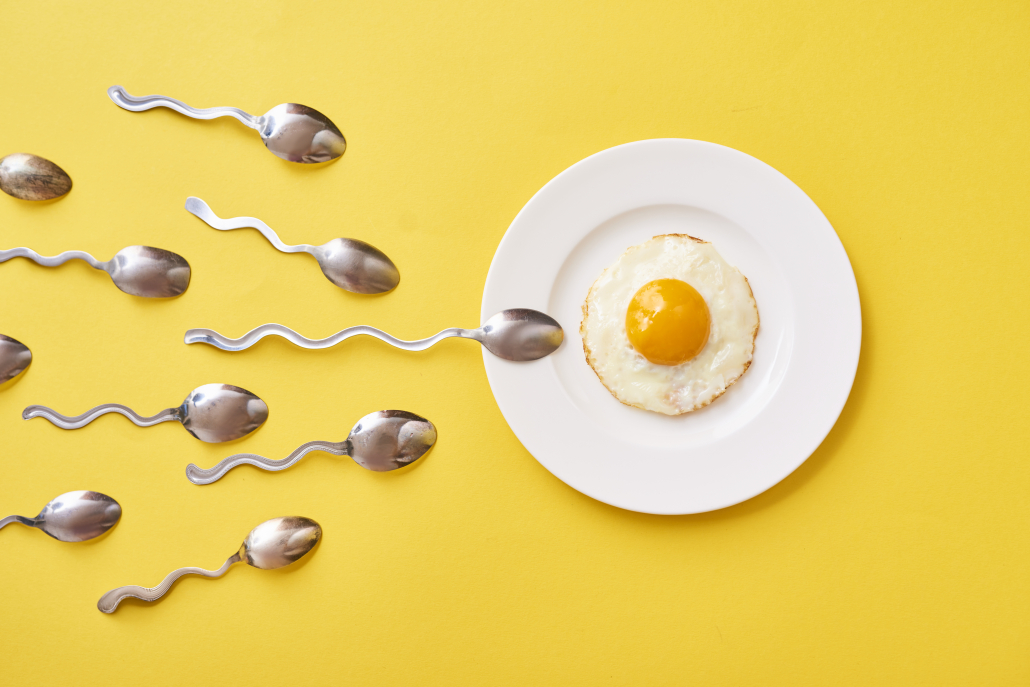
Table of Contents
- The basic principles of a fertility diet
- High fat, low carb = reduced inflammation
- Fiber Causes Inflammation
- High fat, low carb = balanced reproductive hormones
- Foods to Increase Fertility
- Other Fertility Diet Foods
- Foods to Avoid on a Fertility Diet
- Supplementing Your Fertility Diet
- Fertility Diet: The Bottom Line
“A doctor who treats a disease after it has happened is a mediocre doctor. But a doctor who treats a disease before it happens is a superior doctor.”
The Yellow Emperor’s Classic of Internal Medicine
“Let food be thy medicine and medicine be thy food”
Hippocrates
Ancient cultures had it figured out millennia ago: good prevention is worth more than a good cure.
And when it comes to preventing infertility, the food you eat can be the key. According to reproductive endocrinologist Dr. Robert Kiltz, “our diet […] is the single greatest factor we have control over that can radically increase the odds of conception and pregnancy.”
A fertility diet can increase your fertility rate regardless of whether you’re trying to get pregnant the traditional way, or undergoing fertility treatments like IUI or IVF.
Following a fertility diet can positively impact both men and women. Men who follow a fertility diet can experience increased sperm quality and motility; and women may experience improved egg quality, reduced risk of pregnancy complications, and improved overall preconception wellness.
In this article we’ll go over every aspect of a natural, effective fertility diet, including:
- The basic principles of a fertility diet
- Foods to increase fertility
- Foods to avoid
- Supplements to fill nutrient gaps
While the fertility diet Dr. Kiltz has designed can have powerful positive impacts, its effects don’t usually kick in immediately. Sperm and eggs both take about 70-90 days to develop. To get the full spectrum of benefits from your fertility diet, so stick with it.
Let’s get started!
The basic principles of a fertility diet
Hundreds of studies and countless real-world experiences support the idea that a high fat, low carbohydrate diet is the best diet for your fertility.
This may sound controversial, but it’s still true. Dr. Kiltz and other fertility experts have found that a high-fat, low-carbohydrate diet is the first recommendation when it comes to improving fertility.
Eating this way goes against the so-called “healthy” eating habits we were taught in school. Most of those ideas, however (like the eating lots of whole grains and limiting saturated fat), have already been debunked as a combination of misinformation and clever marketing.
More recent and better science has shown us that dietary fat, including saturated fat, provides key building blocks for every cell in our body — and is vital for fertility.
A diet rich in fat and low in carbohydrates can improve fertility in two major ways:
High fat, low carb = reduced inflammation
Reducing inflammation is the most important (and first) step in any fertility-friendly diet.
Why? Because chronic inflammation is the leading driver of disease. It wreaks havoc on the body, mind, and reproductive system. Dr. Kiltz confirms: “inflammation is one of — if not the — leading causes of infertility.”
Studies have shown that chronic inflammation causes widespread tissue damage, while reducing blood flow and preventing the body from using nutrients properly. It’s for this very reason that common fertility treatments are often used in conjunction with circulation-boosting antibiotics, steroids, aspirin, or phospholipids.
While these drugs can help suppress the immune system and improve fertility rates, you can get more dramatic and sustainable results from dietary changes. A high-fat, low-carb keto diet can reduce inflammation in 3 key ways.
A high-fat, low-carb diet reduces inflammation by:
- Reduces sugar intake. Sugar causes inflammation.
- Reduces fiber intake. Fiber causes inflammation.
- Reduces plant toxins. Plant Toxins cause inflammation.
- Increases fat. Fat protects against inflammation.
Sugar Causes Inflammation
The image of white, processed sugar conjures up thoughts of diabetes, obesity, and other health problems in the minds of many.
Less obvious is that complex carbs are ultimately broken down into the very same sugary substances — glucose, fructose, etc. — that simple sugars are.
Complex carbs can also spike insulin just as powerfully as their less healthy counterparts. Numerous studies have shown that carbs of all sorts can cause inflammation. And the carbs we get from plant-foods are often laden with plant toxins and antinutrients that further tax your metabolic systems.
A 2011 study showed that even small amounts of sugar (200 calories of a sugar drink) spiked certain inflammatory markers within 30 minutes of ingestion.
So it’s easy to see that in order to reduce inflammation we have to reduce the sugar we eat. But most of us run into a problem when we think of plant-based food sources as “healthy” carbs. When you follow the recommended diet of 3 meals a day based on high-carb plant foods like grains and fruits, you are consuming chronically high amounts of sugar.
For our bodies, there’s very little difference between a candy bar, kale, or an apple. Sure kale may have a few extra nutrients in it, but a majority of it gets broken down into, you guessed it, sugar. That’s right, every carb we eat, from lettuce to a lollipop, is eventually metabolized as simple sugars (glucose, fructose, and galactose).
If you’re eating a high-carb standard American diet, those carbs from processed grains, added sugars, vegetables, and fruits are aiming a steady stream of glucose through your whole body, setting in motion a series of damaging chemical reactions.
Sugar triggers insulin production raises stress hormones and inflammation while depleting minerals and endogenous antioxidants that would otherwise protect you against inflammation.
The good news is that the inflammation caused by high-carb diets can be quickly reversed by dietary changes. A 2014 study demonstrated that reduced carb intake directly reduced key inflammatory markers.
Even the fiber content of carbohydrate-rich foods can be a problem. Why? Because processing fiber generates heat. Fermentation within your colon can heat up your entire digestive tract. This can disrupt reproductive processes because these organs are designed to operate at a specific body temperature, and they can be easily damaged by heat.
The good news is that the inflammation and heat damage caused by high-carb diets can be quickly reversed by dietary changes. A 2014 study demonstrated that reduced carb intake directly reduced key inflammatory markers.
Given the clear link between insulin, inflammation, and carbohydrate intake, an ideal fertility diet will limit excess carbs.
Fiber Causes Inflammation
Fibers are complex carbohydrates and strands of poorly or non-digestible long chain carbs.
When you chew fiber, you simplify it and expose it to bacteria and yeasts that feed on it during the process of digestion.
The ensuing fermentation produces heat, gas, aldehyde, alcohol, and methane. This heat from this exothermic reaction damages local organs and tissues.
Have you ever looked outside at a compost bin in the winter? It’s steaming! Many of the processes taking place in that compost bin are taking place in your gut–the part of you that sits directly on top of your reproductive organs!
Dr. Kiltz’s observations as a fertility doctor suggest that fiber fermenting in your bowels spreads heat and inflammation to tissue and organs throughout the entire lower abdominal region, including your tubes, ovaries, uterus, prostate, seminal vesicles, and testicles.
This is critical because our reproductive organs are designed to function at a very specific body temperature and can be damaged by heat. That’s why all fertility doctors advise men against sitting in Jacuzzis and hot baths.
While you’re probably familiar with the idea that sperm require a very precise temperature that’s lower than body temperature to remain healthy (the reason men have reproductive organs outside the main body), eggs do too!
The difference is that optimal temperature for egg development happens to be at body temperature–37 degrees celsius or 98.6 fahrenheit. This is why women don’t need a scrotum to lower the ovaries outside the body to cool them down. But when excessive fermentation takes place right beside the ovaries, the temperature can rise substantially above optimal conditions for egg development.
Reducing Fiber
For most of you, this “cut the fiber” line is likely coming as a complete shock. We’ve all been told for decades that fiber is good for us. So what’s the rub (pun intended)?
Mainstream recommendations for fiber stem from studies that show fiber can moderately reduce blood sugar spikes by slowing down the normal process of digestion when you’re eating a normal American diet that’s high in carbs and added sugars.
However, when you’re practicing an HFLC fertility diet, there is no need to protect against blood sugar spikes because you aren’t eating much sugar in the first place!
What about the widespread belief that fiber is good for colon health? That it’s necessary for bowel movements? And that it protects against cancer? It’s a total myth.
When we look past the propaganda and examine what the high-quality studies actually tell us, we find that fiber causes constipation.
The authors of a 2012 study published in the World Journal of Gastroenterology looking at the effects on fiber on constipation found, “the previous strongly-held belief that the application of dietary fiber to help constipation is but a myth. Our study shows a very strong correlation between improving constipation and its associated symptoms after stopping dietary fiber intake.”
Another eye-opening study in the WJG looking at all the studies over the previous 35 years investigating the link between fiber and colon health, concluded that:
“A strong case cannot be made for a protective effect of dietary fiber against colorectal polyp or cancer. Neither has fiber been found to be useful in chronic constipation and irritable bowel syndrome. It is also not useful in the treatment of perianal conditions. The fiber deficit-diverticulosis theory should also be challenged…we often choose to believe a lie, as a lie repeated often enough by enough people becomes accepted as the truth. We urge clinicians to keep an open mind. Myths about fiber must be debunked and truth installed.”
The only way to reduce fiber is to reduce plant foods.
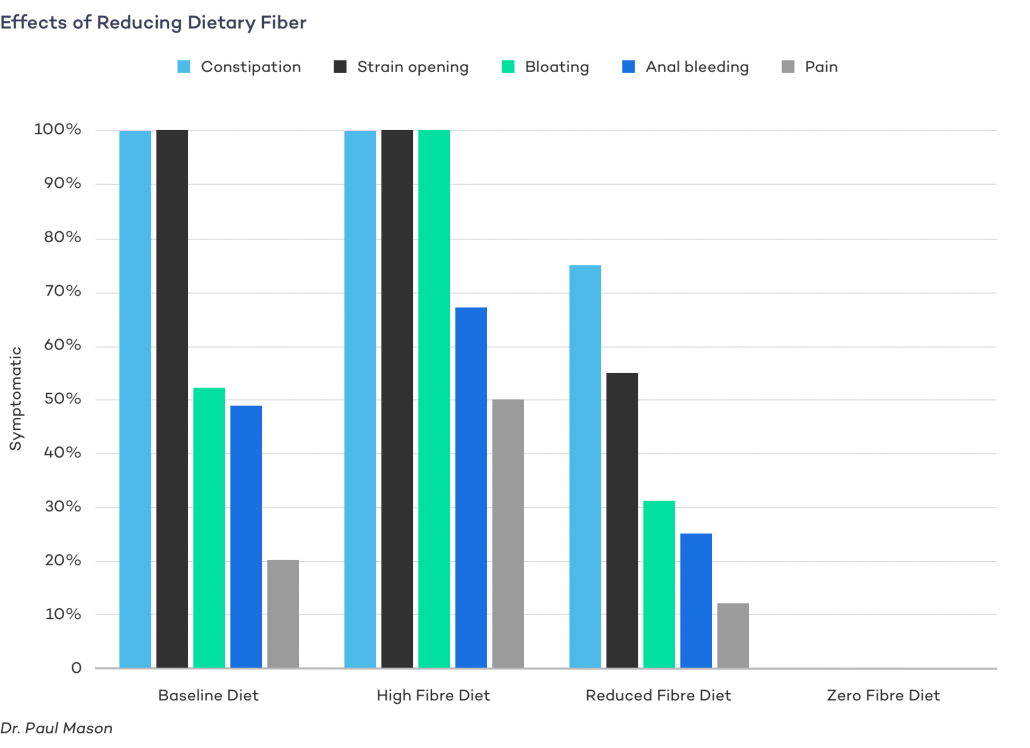
Plant Foods Cause Inflammation
Wait a minute, you might be thinking, aren’t plants healthy?
That depends. On one hand, plants contain antioxidants and other beneficial compounds; on the other hand, they also contain antinutrients and naturally occurring pesticides meant to deter anything (including humans) from eating them.
A large percentage of the plants we ingest on a routine basis contain a variety of plant toxins. Plants that have been damaged or stressed may have even higher levels of natural pesticides. Common plant toxins include lectins and phytates. Other plant toxins, like oxalates, aren’t a problem in small doses but can build up in our systems and have serious effects for sensitive people.
Experts estimate that the average American eats roughly 1.5 grams of naturally occurring plant ‘pesticides’ each day. That’s roughly 10,000 times more than the amount of synthetic pesticides we get from these foods. And remember, Just because something is natural doesn’t mean it’s safe — see cyanide for an example.
These plant toxins become especially dangerous as they build up over time. In humans , routinely ingesting them can cause inflammation, autoimmune skin conditions, hypothyroidism, and more.
Below is a more complete list of plant pesticides that are known to be carcinogenic — i.e. cancer-causing.
Other common plant chemicals and their effects include:
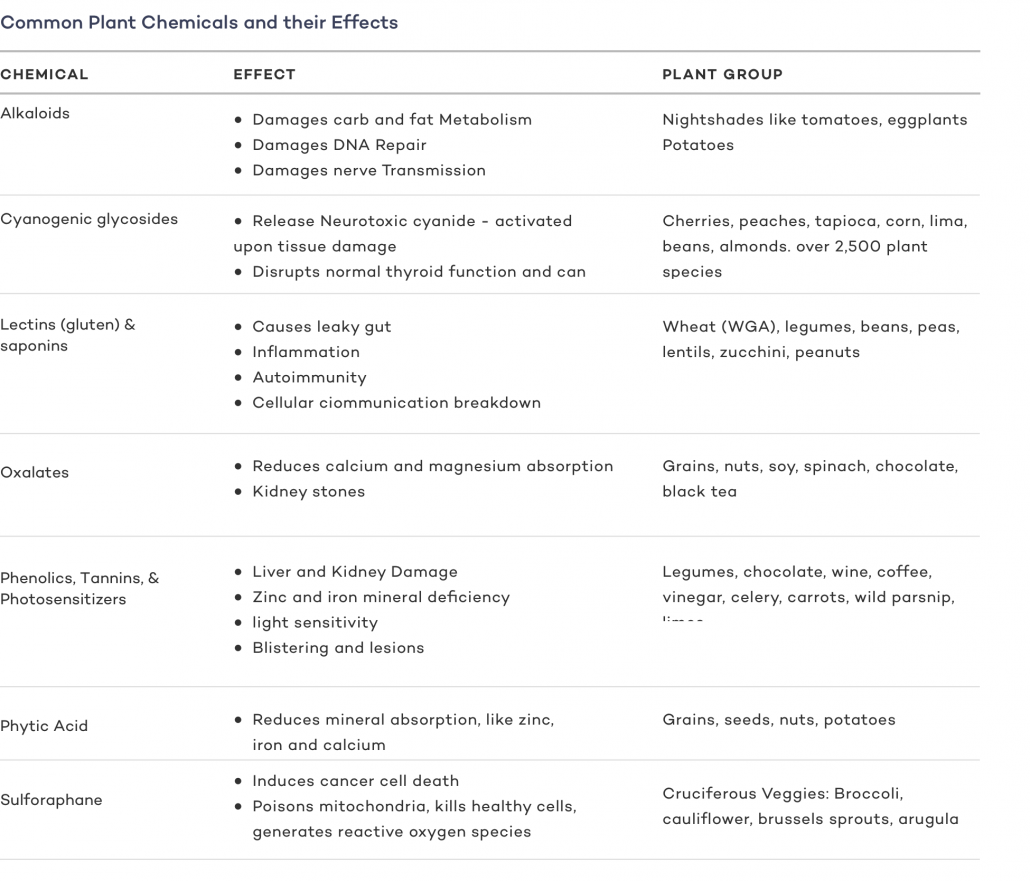
Eating Fat Reduces inflammation
Eating healthy fats is one of the most powerful things you can do to reduce inflammation and increase fertility.
Studies have shown that dietary fat reduces inflammatory markers like C-reactive protein. Fat provides more direct ‘mechanical’ benefits, too, as it helps maintain the structure and integrity of your cells.
Fat is so anti-inflammatory that it can reduce the danger of toxic substances like alcohol, delay the formation of cancers, and more. Dietary fat may also lower inflammation in the context of healthy fertility and pregnancy.
High fat, low carb = balanced reproductive hormones
In addition to reducing inflammation, a high-fat, low-carb fertility diet can improve your reproductive hormone levels.
How? Through three equally important and holistic pathways.
- Healthy fats provide your body with the building blocks it needs to produce important hormones.
- Low carbohydrate intake prevents insulin from wreaking havoc on hormone metabolism
- Reducing high-carb plant foods means less exposure to hormone-mimicking plant substances.
High fat = improved hormone Synthesis
Several of the most important reproductive hormones, including “steroid hormones” like progesterone, pregnenolone, estrogen, and testosterone, are all synthesized from a special molecule called cholesterol.
An example of nature’s wisdom is how nearly all foods that are high in cholesterol are also high in healthy fats and low in carbohydrates. Cholesterol-rich superfoods include eggs, beef liver, seafood, cheese, and more.
In addition to playing such a vital role in steroid hormone synthesis, cholesterol is also required for your body to make vitamin D from sunlight. Vitamin D is unique in that it’s both a vitamin and a hormone. And sufficient vitamin D is strongly correlated with better fertility.
Yet another benefit of cholesterol: improved brain function. Cholesterol intake has been correlated with intelligence, positivity, and general mental health. Not eating enough cholesterol during pregnancy may result in low reproductive hormone levels, as your brain’s cholesterol needs are given priority above all else.
Low Carb = Improved Hormone Regulation
Eating a lower carbohydrate diet also prevents insulin from skewing your overall hormone profile.
Hyperinsulinemia, or chronically high insulin, can cause the ovaries to make testosterone instead of estrogen and contribute to PCOS.
PCOS is also correlated with obesity, type 2 diabetes, gestational diabetes, and cholesterol problems. It’s not a coincidence that all these problems have been linked to chronically high insulin levels.
While high carbohydrate intake triggers insulin release, following a low-carb diet is one of the most effective ways to lower baseline insulin levels. Studies have shown that this type of diet can have a powerful effect on metabolic syndrome and PCOS.
A 2018 study cited showed that every PCOS patient who switched to a high fat, low carb diet regained regular menstruation and ovulation. Half of these patients were then able to get pregnant naturally — without needing any additional fertility treatments.
Phytomimicry: Hormone disturbances
Following Dr. Kiltz’s fertility diet may mean less exposure to hormone-mimicking plant substances — notably phytoestrogens.
Foods that are high in phytoestrogens (like soy) have been correlated with decreased fertility in both men and women.
Other plants have estrogenic activity, too. Prime culprits include flax seeds, sesame seeds, oats, wheat, beans, rice, alfalfa, rye, barley, apples, and carrots. All these foods contain some amount of phytoestrogen.
It’s thought that plants make these fertility-decreasing substances for the same reason that they make other antinutrients: to ward off creatures that would otherwise eat them.
Besides causing infertility in humans and animals, phytoestrogens don’t play any known biological role for the plants that produce them.
Foods to Increase Fertility
If you’re looking for an antidote to the many fertility-reducing foods, look no further. A wide variety of animal products can boost fertility by benefiting fertility hormones.
Fertility Diet Foods: Liver & Steak
Liver and steak are both excellent sources of fat, protein, and bioavailable vitamins.
Beef liver, in particular, is one of nature’s original superfoods. It’s a rich source of vitamin C, vitamin E, vitamin D, vitamin B12, and zinc. All of these nutrients have been shown to play a crucial role in improving fertility. If you’re trying to get pregnant, don’t skimp on the liver.
Beef liver is so rich in nutrients that it doesn’t need to be your only protein source. That’s where the importance of regular muscle meat comes in. Consider eating a small portion of liver once or twice a week — and eating muscle meat ad libitum.
If they come from grass-fed animals, the benefits of steak and liver get even better. Grass-fed beef is rich in essential fatty acids, like conjugated linoleic acid, that have been correlated with improved nutrient partitioning.
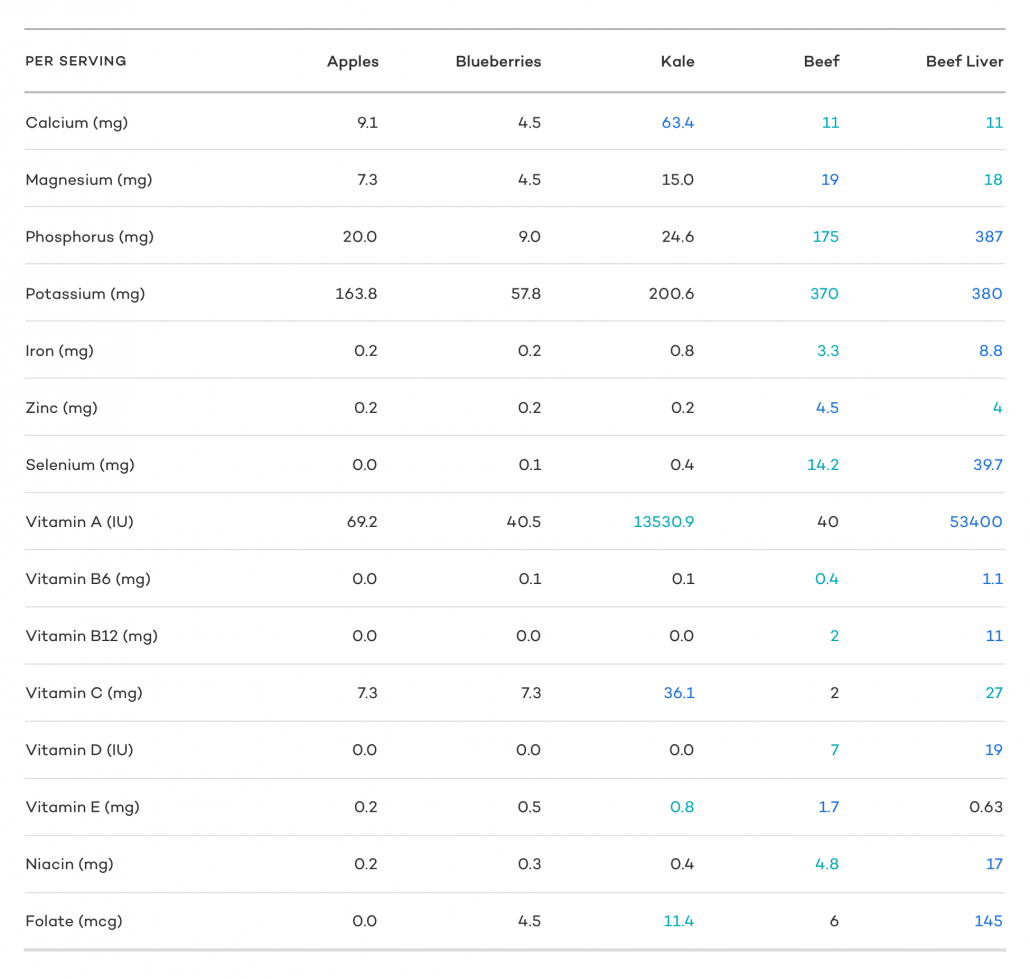
Fertility food: eggs
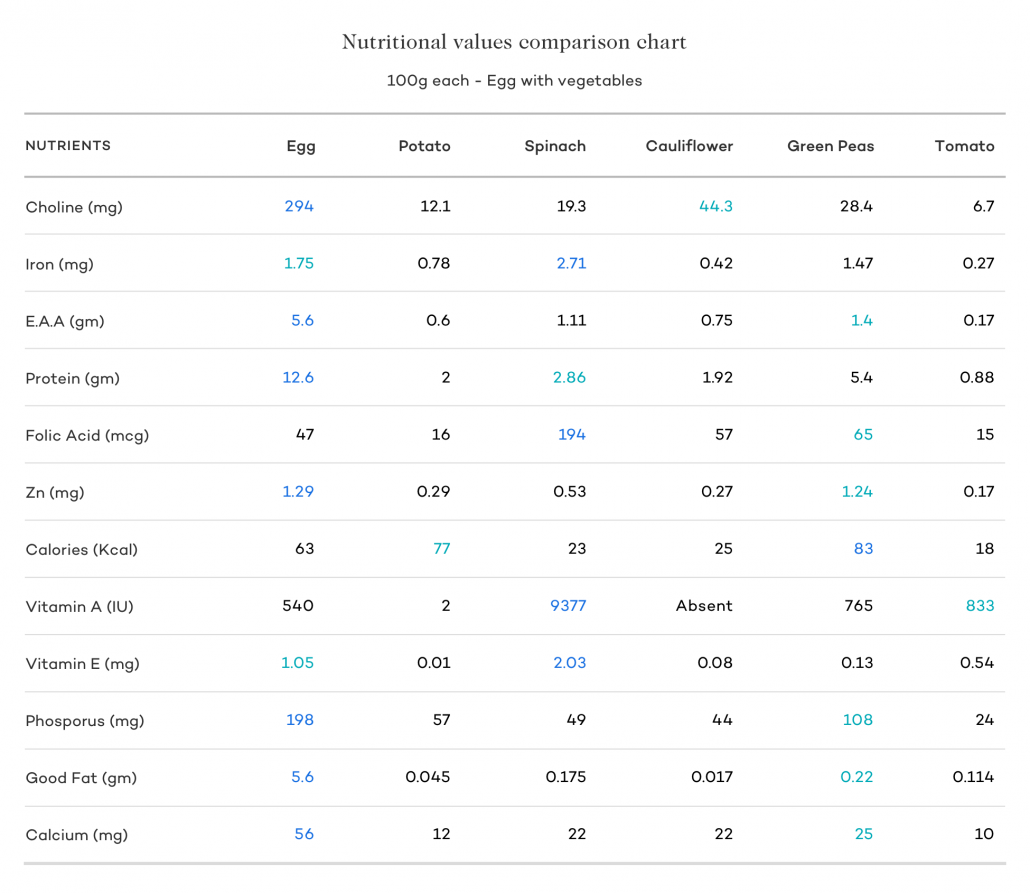
Eggs are another fertility food that should top the list for anyone who’s trying to get pregnant.
Loaded with everything needed to produce a healthy chick, eggs also contain virtually every nutrient needed to sustain human life — including vitamin E, vitamin B12, choline, zinc, and essential fatty acids.
Vitamin E may be especially helpful for male fertility rates. Studies show that it can affect sperm quality and motility. Doctor Kiltz and other fertility specialists recommend that men and their wives/partners eat eggs daily if they’re trying to conceive. And don’t skip the yolks — that’s where most of an egg’s nutrients are located.
Eggs are also an excellent source of choline. This often-overlooked nutrient needs to be obtained through your diet, especially throughout pregnancy since your body can only produce small amounts of it on its own.
Choline supplementation may reduce the risk of certain birth defects. Additionally, ensuring adequate choline intake may set your child up for optimal health throughout the course of their entire life. This nutrient also promotes:
- Placental development
- Neurological development
- Fetal growth and differentiation
- Reduced risk of chronic diseases later in life
Fertility food: fatty fish
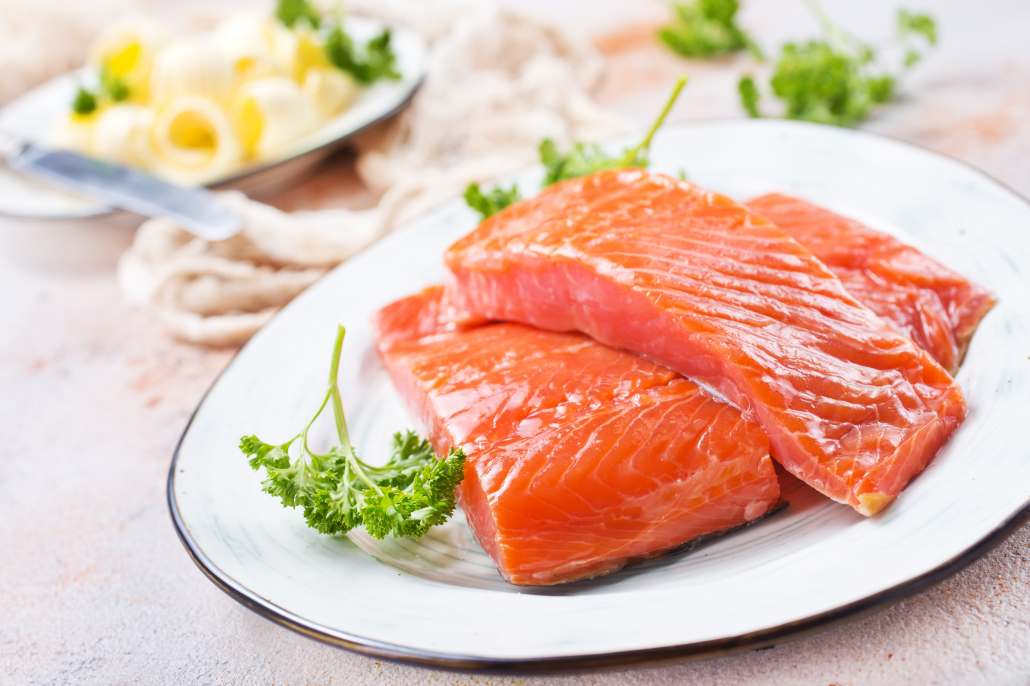
Fatty fish are one of nature’s best sources of omega 3 fats.
These fatty acids may benefit both male and female fertility, so they’re great foods for anyone who’s trying to get pregnant. In males, omega 3’s assist with sperm production; in females, they help maintain reproductive cells called oocytes.
Fatty fish like salmon are also high in vitamin D, which plays an important role in many aspects of reproductive health. Consider treating salmon almost like a supplemental food — especially if you live in a locale where it’s hard to get consistent sunlight.
Salmon is also a great source of iodine. Iodine is critical for fertility and thyroid health alike. Studies show that those who are deficient in this nutrient have a 46% lower chance of getting pregnant, implying that iodine directly improves fertility.
As great as salmon is, there may be an even better option: salmon roe. Salmon roe contains huge amounts of omega 3 fats in an easily absorbable form. Ancient cultures did everything they could to give this ancestral superfood to their pregnant women.
Fertility Food: Pork Belly
Pork belly is tasty and ultra-nutritious. A close relative to bacon, pork belly is a rich source of B vitamins, selenium, and healthy fats. It’s a great addition to any keto diet (unless you’re doing vegan keto, that is!).
Pork belly’s nutrient profile becomes even more important when you consider that it contains several pro-fertility nutrients. It’s a rich source of selenium, which acts as an antioxidant when the ovaries are developing and releasing eggs.
Fertility food: butter
Butter is a vital part of Dr. Kiltz’s keto diet, also known as the B.E.B.B.I. (pronounced “baby”) diet:
- Bacon (Fresh pork belly)
- Eggs
- Butter
- Beef
- Ice Cream (Dr. Kiltz’s keto homemade)
Butter is rich in nourishing fats and incredibly rich in cholesterol. A single tablespoon of butter contains 31 milligrams of cholesterol, which is roughly a tenth of your RDA.
Cholesterol, in turn, is converted by your thyroid into all those important reproductive hormones we mentioned earlier. Cholesterol is also a component in breast milk. The bottom line is don’t be scared about dietary cholesterol — it’s essential for your baby’s healthy growth and development.
The fat in butter also deserves some attention. It contains over 400 different fatty acids in total. Some of them, like butyric acid, play an important role in maintaining good gut health.
Fertility Diet food: Full-Fat Dairy
Butter isn’t the only dairy product that has fertility benefits.
Cream, cream cheese, whole milk, yogurt, and cheese are also great sources of healthy fats. In addition to being rich in fat and cholesterol, these foods contain zinc, choline, selenium, vitamin A, vitamin D, and vitamin K2.
The vitamin A content of full-fat dairy supports egg quality, development, and overall placental function. Vitamin A supports immune health, too, so it’s a great choice for mothers who want to stay healthy throughout pregnancy. Full-fat dairy also contains large amounts of calcium, a nutrient that supports fertility in both sexes.
One word of advice: don’t shy away from dairy on the basis of its fat content. Recent research has shown that the saturated fat in dairy is actually protective!
“Total and especially full-fat dairy food intakes are inversely and independently associated with metabolic syndrome in middle-aged and older adults, associations that seem to be mediated by dairy saturated fatty acids,” concluded one 2016 study. “Dietary recommendations to avoid full-fat dairy intake are not supported by our findings.”
Fertility Diet Food: Mature Cheese
While full-fat dairy is almost always a good choice, aged dairy products deserve a special mention.
Aged dairy (including cheddar, gouda, or parmesan cheese) has the added benefit of being rich in a class of fertility-boosting protein known as polyamines. Mature cheese is high enough in certain polyamines that it may directly improve sperm health. These same polyamines may also improve egg health, especially in women who are over 35.
Other Fertility Diet Foods
For most people cutting out all fruits and veggies or going full carnivore can feel intimidating. So here are a few more fertility foods that make the cut.
Asparagus
Asparagus is loaded with folate and other important nutrients.
Vitamin B12/folate can help improve male and female fertility and impact fetal development. And ensuring adequate levels of folate throughout pregnancy can prevent neural birth defects. Folate may also increase the success rate of IVF fertility treatment.
In males, folate can help improve fertility by ensuring that the sperm’s DNA replicates accurately without mutations.
Pomegranates
Pomegranates are rich in certain antioxidants that may boost your fertility. They also contain vitamin C, vitamin B12, and potassium — all of which are known to positively impact male fertility.
Walnuts
Walnuts are rich in amino acids, magnesium, and essential fats. A single serving contains well over 100% of your body’s daily magnesium requirements. Magnesium may have an indirect link to fertility: by helping the liver chelate and remove toxins, it could reduce the risk of toxin-related infertility.
By calorie, walnuts are about 15% protein and 65% fat, which also makes them ideal for people following a high-fat, low-carb keto diet, especially if you’re vegan or vegetarian
Berries
Berries are more than just another sweet snack. Most berries are lower in sugar than other fruits and loaded with antioxidants and other phytonutrients that may counter sugar’s oxidizing effects. In theory, at least, berries contain enough folate and vitamin C to promote fertility.
Citrus Fruit
Citrus fruits contain a broad spectrum of a variety of nutrients, including:
- Folate
- Vitamin C
- Potassium
- Calcium
Citrus fruits are also high in naringenin, a rare antioxidant that’s one of the known natural phyto progestogens in existence. (Fruits and veggies usually have estrogenic, not progesteronic, qualities.)
This property could make citrus fruits a good addition to one’s fertility diet, especially if hormonal balance is a concern. Just remember it’s easy to go overboard with sugar in citrus, so you’d have to enjoy it very sparingly.
Foods to Avoid on a Fertility Diet
“It is not daily increase but daily decrease [that matters], hack away the unessential.”
– Bruce Lee
It turns out that Bruce Lee’s perspective applies to both martial arts and ways of eating. Though it’s fun to focus on fertility-friendly dietary additions, the truth is that eliminating harmful foods from your diet is just as important.
Foods to Avoid: Sugar and Carbs
As we mentioned earlier on, both simple and complex carbs can trigger inflammatory processes that reduce fertility.
The high insulin levels seen on a high-carb diet can negatively affect reproductive hormones, and this results in anovulation and other infertility symptoms. One small study identified a ~20% improvement in cycle ovulation when patients ate a low glycemic diet. It’s possible that even larger improvements could happen on a dedicated low carb diet.
Foods that are high in sugar/carbs include bread, pastries, rice, potatoes, candy, fruit, and fruit juices. Limit these foods as much as possible if you’re trying to boost your fertility. (Low-carb fruits like berries may be an exception. See our article on fruit for more info.)
Food to Avoid: Soy
Soy foods are rich in phytoestrogens that can negatively impact both male and female fertility.
Research has shown that soy can directly impact a woman’s ovarian function. Eating excess soy may lead to lower levels of gonadotropin, a hormone that initiates pregnancy by supporting newly fertilized eggs.
Soy ingestion affects premenopausal women more than any other group, so keep soy to a minimum if you’re a woman who’s trying to get pregnant. Foods high in soy include edamame, imitations meats, and soy products like soy sauce and soy milk.
Food to Avoid: Fiber
As we detailed earlier, fiber leads to excess intestinal heat that can damage nearby reproductive organs.
It’s true: fiber isn’t as important for bowel motility as previously thought, and too much fiber can negatively impact fertility. High fiber diets may lead to a higher chance of anovulation in women.
Food to Avoid: Alcohol
Is alcohol a food?
That’s debatable, although ethanol is indeed a macronutrient that provides the body with some energy.
In any case, ethanol is one of the most important foods to avoid if you’re trying to get pregnant.
Mothers who drink alcohol during pregnancy risk birth defects, low birth weight, and other complications. Alcohol can damage male fertility, too — it’s capable of shrinking of the testes, reducing sperm motility, and lowering testosterone levels.
All in all, alcohol should be avoided by both sexes when trying to get pregnant.
Supplementing Your Fertility Diet
Soil depletion and other food supply issues mean it can be difficult to get all the nutrients the pregnant body needs, even on an ideal fertility diet.
That’s where the importance of strategic supplementation comes in. Fertility supplements like those found at Molecular Fertility contain a select blend of vitamins, minerals, antioxidants, and other nutrients known to improve fertility. Consider supplementation if you want to improve your fertility outcome.
Fertility Diet: The Bottom Line
Eating for fertility may seem like a daunting task at first, but it’s actually quite simple.
You can begin by using Dr. Kiltz’s B.E.B.B.I. diet as a rule of thumb. It’s largely based on what couples trying to conceive have done for millennia: prioritize the most nourishing animal foods while avoiding known dietary toxins.
- Bacon (Fresh pork belly)
- Eggs
- Butter
- Beef
- Ice Cream (homemade keto)
If you base your diet around these low-carb, high-fat foods, you can’t go wrong. Bonus points if you include animal-based superfoods, too.
Optimizing your fertility in this natural way is fun, nourishing, and enjoyable.






















